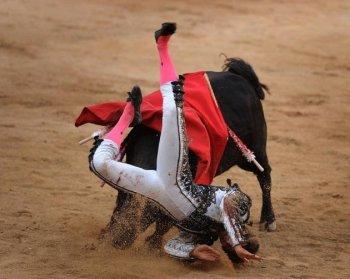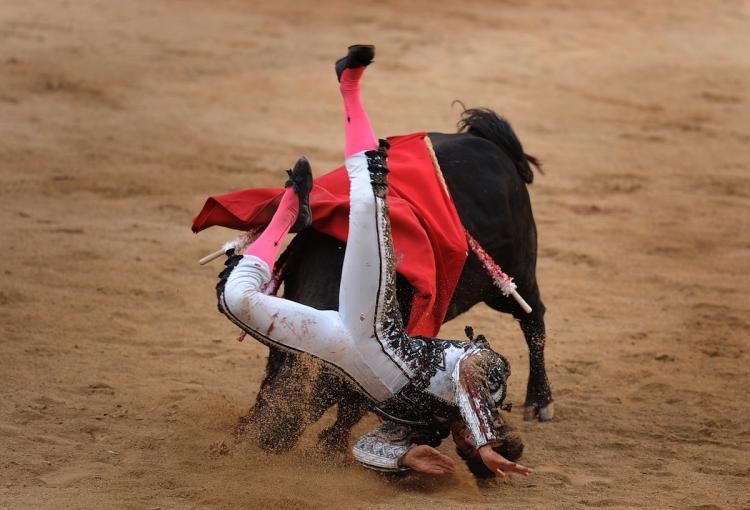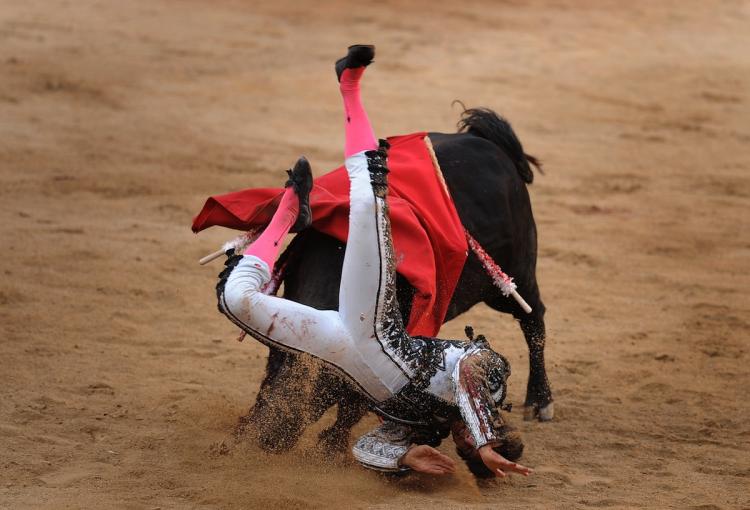Lethal bullfighting was banned in the Spanish autonomous region of Catalonia by a parliamentary vote of 68 to 55 on Wednesday, following a debate among animal rights activists and Spain’s culture.
The coastal state Catalonia, whose capital is Barcelona, became the first mainland Spanish state to place a ban on the centuries-old spectacle. The Canary Islands enforced a ban in 1991.
The new law, which goes into effect January 2011, outlaws the bloodiest version of the sport in which the bull is tormented and ultimately killed. The ban does not include bullfights that do not result in the bull’s demise, according to an announcement from the Catalonian Parliament.
A coalition of animal protection activists called PROU, spearheaded the ILP (Initiative Legislative Popular) campaign to abolish bullfighting. They mobilized over 1,000 activists to help collect more than 180,000 signatures, says their press release.
At a celebratory press conference following the vote, a PROU representative said the group was satisfied with the fruits of their efforts.
“It is not a matter of whimsical prohibitions or of stomping on people’s individual freedoms. It is a matter of suffering,” said its press statement.
The summary positions in the long drawn out debate over banning the bullfight boil down to the abolitionists arguing that Catalan society must progress and discard its inhumane practice. While conformists said that the sport that dates back to the eighth century should stay as it is an icon of Spain. Others turned the issue political saying that Catalonia should not follow other Spanish states, the majority of which are against bullfighting.
Bullfighting had already become less popular in the region over the past several years.
Councils in 45 towns and cities in Catalonia have passed declarations opposing bullfighting. And a Gallup poll from 2007 revealed that only 7 percent of Spaniards are “very keen” on bullfighting.
The number of bulls killed in official bullfights in Spain in 2006 was 11,458, according to statistics from the Spanish Ministry of Interior, reports the organization Bullfighting-free Europe. The organization says, however, it believes that the number is closer to 40,000 bulls since many are killed in mobile bullrings and during training.
Bullfighting has been banned in cities in Ecuador, Venezuela, France, Portugal and Colombia, according to the World Society for the Protection of Animals. Today, nine countries in the world still allow bullfighting.
The coastal state Catalonia, whose capital is Barcelona, became the first mainland Spanish state to place a ban on the centuries-old spectacle. The Canary Islands enforced a ban in 1991.
The new law, which goes into effect January 2011, outlaws the bloodiest version of the sport in which the bull is tormented and ultimately killed. The ban does not include bullfights that do not result in the bull’s demise, according to an announcement from the Catalonian Parliament.
A coalition of animal protection activists called PROU, spearheaded the ILP (Initiative Legislative Popular) campaign to abolish bullfighting. They mobilized over 1,000 activists to help collect more than 180,000 signatures, says their press release.
At a celebratory press conference following the vote, a PROU representative said the group was satisfied with the fruits of their efforts.
“It is not a matter of whimsical prohibitions or of stomping on people’s individual freedoms. It is a matter of suffering,” said its press statement.
The summary positions in the long drawn out debate over banning the bullfight boil down to the abolitionists arguing that Catalan society must progress and discard its inhumane practice. While conformists said that the sport that dates back to the eighth century should stay as it is an icon of Spain. Others turned the issue political saying that Catalonia should not follow other Spanish states, the majority of which are against bullfighting.
Bullfighting had already become less popular in the region over the past several years.
Councils in 45 towns and cities in Catalonia have passed declarations opposing bullfighting. And a Gallup poll from 2007 revealed that only 7 percent of Spaniards are “very keen” on bullfighting.
The number of bulls killed in official bullfights in Spain in 2006 was 11,458, according to statistics from the Spanish Ministry of Interior, reports the organization Bullfighting-free Europe. The organization says, however, it believes that the number is closer to 40,000 bulls since many are killed in mobile bullrings and during training.
Bullfighting has been banned in cities in Ecuador, Venezuela, France, Portugal and Colombia, according to the World Society for the Protection of Animals. Today, nine countries in the world still allow bullfighting.




